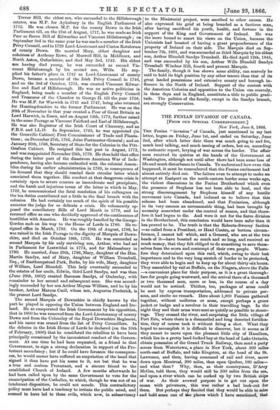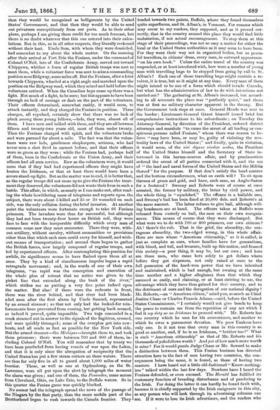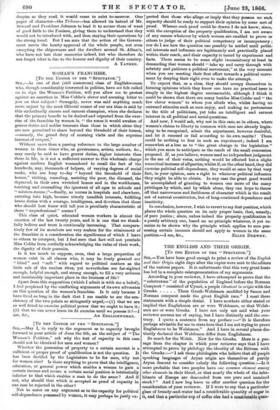THE FENIAN INVASION OF CANADA. [Fnolor OUR SPECIAL CORRESPONDENT.] New
York, June 8, 1866. THE Fenian " invasion " of Canada, just mentioned in my last letter, began on Friday, June 1st, and ended on Saturday, June 2nd, after which latter date there was much going to and fro, much loud talking, and much issuing of orders, but no, according to authentic report, levying of war across the border. The affair soon received its quietus at the hands of the Government at Washington, although not until after there had been some loss of life and much disturbance in Canada. To understand how even this happened, it must be remembered that the Fenian excitement had almost entirely died out. The failure even to attempt to make an attempt at Eastport on the north-eastern border some weeks ago, the violent dissensions in the Fenian Brotherhood which even the presence of Stephens has not been able to heal, and the strong discouragement by Stephens himself of any hostile movement into Canada, had induced us to believe that this scheme had been abandoned, and that Fenianism, although in its very essence an unreasonable thing, had been brought by necessity somewhat under the control of reason, and that there- fore it had begun to die. And were it not for the fierce division in the Brotherhood, this conclusion would have been safer than it has proved to be. The truth is that the Roberts-Sweeny faction -so called from a President, or Head Centre, or bottom circum- ference, I cannot tell which, and a General, who are at the two heads of it-have boasted so much and so long, and received so much money, that they felt obliged to do something to save them- selves from the scorn and contempt of their own people. Where- fore they determined upon this raid, which, owing to their lost importance and to the very long stretch of border to be protected, they were able to begin and to keep up for about thirty-six hours. Theyassembled by rail at Buffalo, on the Niagara, above the Falls -a convenient place for their purpose, as it is a great thorough- fare for people going westward, and the arrival there of a thousand or two thousand men, more or less, in the course of a day would not be noticed. Thither, too, packages of arms could be sent by express transportation, addressed to private per- sons, and excite no remark. Here about 1,200 Fenians gathered together, without uniforms or arms, except perhaps a green jacket or badge and a revolver in their travelling bags. In the night they and their arms were sent as quietly as possible to steam- tugs. They crossed the river, and surprising the little village of Fort Erie, where there is a dismantled and long deserted fortifica- tion, they of course took it without firing a shot. What they hoped to accomplish it is difficult to discover, but it seems as if they meant to move upon the pleasant little city of Hamilton, which lies in a pretty land-locked bay at the head of Lake Ontario,. obtain posaPasion of the Grand Trunk Railway, then send a party across from Watertown, a place in New York, about 200 miles north-east of Buffalo, and take Kingston, at the head of the St. Lawrence, and then, having command of rail and river, move down upon Montreal, 200 miles, then upon Quebec, 180 miles- and what then? Why, then, as their countryman, D'Arcy McGee, told them, they would still be 500 miles from the sea, and upon a river which can be corked up by two British ships of war. As their avowed purpose is to get out upon the ocean with privateers, this was rather a bad look-out for them. But perhaps they fancied that they would be able to seize and hold some one of the places which I have mentioned, that
then they would be recognized as belligerents by the United States' Government, and that then they would be able to send out privateers surreptitiously from our ports. As to their other plans, perhaps I am giving them credit for too much forecast, but there is no doubt whatever that this one entered into their calcu- lations. But in this, as in all other respects, they literally reckoned without their host. Uncle Sam, with whom they were domiciled, had somewhat to say about the whole matter. On the morning after their arrival at Fort Erie the Fenians, under the command of Colonel O'Neil, late of the Confederate Army, moved out toward Chippewa, whither a force of regular British troops was sent to
meet them, while a volunteer force was sent to seize a commanding
position nearRidgway, some miles off. But the Fenians, after a feint towards Chippewa, wheeled at a right angle and marched upon the
position on the Ridgway road, which they seized and held before the volunteers arrived. When the Canadian boys came up there was a fight. Not much of a fight, to be sure; but this appears to have been through no lack of courage or dash on the part of the volunteers. Their officers determined, somewhat rashly, it would seem, to attack instantly, and they charged the Fenians in position. Three charges, all repulsed, certainly show that there was no lack of pluck among those young fellows,—lads, they were, almost all of them. I have seen and talked with them, and they are all between fifteen and twenty-two years old, most of them under twenty. Then the Fenians charged with spirit, and the volunteers broke and were pursued for about a mile. The fact was that the volun- teers were raw lads, gentlemen shopkeepers, artizans, who had never seen a shot fired in earnest before, and that their officers were as green as they were ; while the Fenians had, perhaps half of them, been in the Confederate or the Union Army, and their officers had all seen service. Raw as the volunteers were, it would seem that if they had had experienced officers they might have beaten the Irishmen, or that at least there would have been a severe stand-up fight. But as the matter was to end, it is better that, as the regular troops did not come up to give the Fenians the treat- ment they deserved, the volunteers did not waste their lives in such a battle. This affair, in which, as nearly as I can make out, after read- ing the whole bewildering mass of telegrams and reports upon the subject, there were about 5 killed and 25 or 30 wounded on each side, was the only collision during the brief invasion. At another point the volunteers were fortunate enough to take 66 Fenians prisoners. The invaders were thus far successful, but although they had not been twenty-four hours on British soil, they were face to face with the insuperable difficulty which every man of common sense saw they must encounter. There they were, with- out artillery, without cavalry, without ammunition or provisions other than that which each man could carry for himself, and with- out means of transportation ; and around them began to gather the British forces, now largely composed of regular troops, and led by experienced officers. After contemplating this position for awhile, its significance seems to have flashed upon them all at once. They by a kind of simultaneous impulse began a rapid retrograde movement ; and, in the words of one of their own telegrams, "so rapid was the conception and execution of the whole plan of retreat that no notice was given to the picket line that extended along the bank of the river," which strikes me as putting a very fine point indeed upon the matter. But alas! if there were the redcoats in front, there was the river behind, and that river had been block- aded soon after the first alarm by Uncle Samuel, represented by an armed steamer ; so that not only had the looked-for rein- forcements been prevented from coming, but getting back seemed, as indeed it proved, quite impossible. Two tugs concealed in a creek steamed out in answer to the signals of the fugitives, crossed, and were quickly thronged ; some of the overplus got into row- boats, and all made as fast as possible for the New York side. But the armed steamer—the Michigan—brought them to, and took them prisoners ; there were between 700 and 800 of them, in- cluding Colonel O'Neil. You will remember that by treaty we have been precluded from having vessels of war upon the Lakes, and that it is only since the abrogation of reciprocity that the United States has put a few steam cutters on these waters. There are thus far only five in all to guard about 1,000 miles of water frontier. These, as well as one at Ogdensburg, on the St. Lawrence, were all put upon the alert by telegraph the moment the alarm was given ; and one of them, the Fessenden, came across from Cleveland, Ohio, on Lake Erie, to the Buffalo waters. So in this quarter the Fenian game was quickly blocked.
No sooner had the telegraph spread the news of the passage of the Niagara by the first party, than the more mobile part of the Brotherhood began to rush towards the Canada frontier. They
tended towards two points, Buffalo, where they found themselves quite superfluous, and St. Alban's, in Vermont. For reasons which may occur to my readers, they supposed, and as it proved cor- rectly, that in the country around this place they would find little molestation, if not actual encouragement. To stop them at this stage of their proceedings, was not so easy a matter for either the local or the United States authorities as it may seem to have been. For they went their way not in organized bodies, but as peace- ful travellers, in citizens' dress, every man, in outward appearance "on his own hook." Unless the entire travel of the country was suspended, or at least interfered with, how were a number of young men with travelling bags to be stopped from going by rail to St. Alban's? Each one of those travelling bags might contain a re- volver, it is true, but so it might at any time. Every man of them might intend to be one of a force which should invade Canada, but what has the administration of law to do with intentions not carried out? The gathering at St. Alban's increased, but accord- ing to all accounts the place was "perfectly quiet," and there was at first no military character apparent in the throng. But the Government took steps at once. General Meade was sent to the border ; Lieutenant-General Grant himself issued brief but comprehensive instructions to his subordinate ; on Tuesday the Attorney-General, by direction of the President, ordered district attorneys and marshals "to cause the arrest of all leading or con- spicuous persons called Fenians," whom there was reason to be- lieve "may have been, or may be, guilty of violating the iseu- trality laws of the United States ;" and finally, quite in violation, it would seem, of the nisi dignus vindice nodus, the President of the United States himself and the Secretary of State in- tervened in this harum-scarum affair, and by proclamation ordered the arrest of all parties connected with it, and the use of "the land and naval forces of the United States and the Militia thereof" for the purpose. If that don't satisfy the head centres and the bottom circumferences, what on earth will? To sit upon thrones of green and gold, and have, each man, an Anglo-Saxon for a footstool ? Sweeny and Roberts were of course at once arrested, the former by military, the latter by civil power, and the whole thing is "squelched." The offence is a bailable one, aud Sweeny's bail has been fixed at 20,000 dols. and Roberts's at the same amount. The latter refuses to give bail, although will- ing bondsmen are at hand. The officers taken at Buffalo were released from custody on bail, the men on their own recogniz- ances. This means of course that they were discharged. But what were we to do with 700 or 800 prisoners, our own citizens? Ah ! there's the rub. That is the grief, the absurdity, the out- rageous absurdity, the two-edged wrong, in this whole affair. Here are men whose "American citizenship," as it is called, is just as complete as ours, whose families have for generations, with blood, and toil, aud treasure, built up this nation, and framed this society—a poor thing, it may be, but our own ; and here are these men, who came here solely to get dollars where before they got sixpences, not only raised at once to the full possession of the hard-won power that we have inherited and maintained, which is bad enough, but owning at the same time another and a higher allegiance than that which they assumed so easily, and claiming, or at least striving to use, the advantage which they have thus gained for their country, and to the detriment of ours and the derogation of our national dignity I Mr. Roberts,—an "American citizen," mind you, as much as Chief Justice Chase or Charles Francis Adams,—said, before the United States Commissioner, "I certainly would not give bonds to keep the peace to restrain me from the repetition of any act which I feel it my duty as an Irishman to proceed with." Mr. Roberta has one country which he uses for his convenience, and another to which he owes a paramount devotion. We poor Yankees have only one. Is it not true that every man in this country is as good as another, and, if he is an Irishman, " betther too ?" What is such "American citizenship" as that of Mr. Roberts and his thousands of yokefellows worth ? And yet of how much more worth is mine? For it would puzzle Judge Chase or Mr. Seward to make a distinction between them. This Fenian business has directed attention here to the fact of men having two countries, the con- sequences being the same, it is found, as those of having two masters. I have heard not a little old-fashioned" Know-nothing- inn" talked within the last few days. Nowhere have I heard the Fenians defended, or even excused. The Herald has fulfilled its customary function of breeding disturbance and of pandering to the Irish. For doing the latter it can hardly be found fault with, because it is chiefly supported by the Irish emigrants in this city, as any person who will look through its advertising columns can see. If it were to lose its Irish advertisers, and the readers who
despise as they read, it wonld cease to exist to-morrow. One paper of character—the Tribune—has allowed its hatred of Mr. Seward and President Johnson to lead it to accuse them of want of good faith to the Fenians, giving them to understand that they would not be interfered with, and then staying their operations by the strong hand. But I am sure that the action of the Govern- ment meets the hearty approval of the whole people, not even excepting the shipowners and the dwellers around St. Alban's, who have not lost their memories indeed, but who therefore do not forget what is due to the honour and dignity of their cotuitry.
A YANKEE.
































 Previous page
Previous page